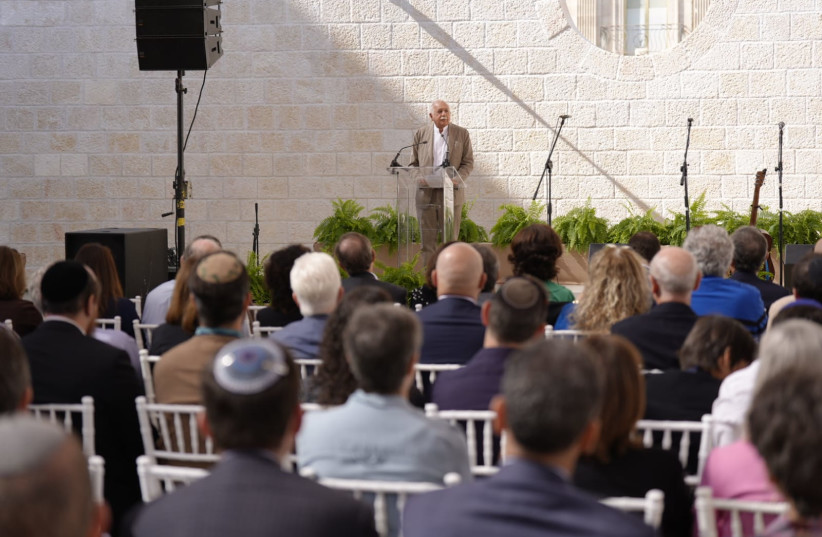President Isaac Herzog said on Sunday that many Diaspora Jews are “not necessarily justified” expressing “anxiety, panic and criticism” of the Israeli elections process.
Herzog spoke at an event titled “Illustrating the profound impact of Hebrew Union College – Jewish Institute of Religion’s (HUC-JIR) Taube Family Campus in Jerusalem.” The event focused on the growth of Reform Judaism in Israel and ties between the Reform Movement and the Jewish state.
Currently, there are more than 200 religious, philanthropic and academic leaders from Israel and the US participating in the event.
During the event, HUC-JIR dedicated the campus’s newly-designed plaza, thanks to a donation from the Taube Family Foundation.
Herzog said he tries to “reach out and promote a policy of love of Israel; of giving solidarity and mutual responsibility within our nation.
“When we hear voices from our Jewish people [in the diaspora] expressing anxiety, panic and criticism that are not necessarily justified, for holding a democratic election, with an unusually high voter turnout and that the Jewish nation participated in this process - chose and determined the outcome.”
Isaac Herzog

“It is crucial for me to express this today,” he continued, “when we hear voices from our Jewish people [in the Diaspora] expressing anxiety, panic and criticism – that are not necessarily justified – for holding a democratic election, with an unusually high voter turnout. And that the Jewish nation participated in this process – chose and determined the outcome.”
Herzog concluded by saying that he “holds his word” – that he will make sure, as president, that “Israel is a Jewish and Democratic state,” which is “committed to the rights of all minorities within, committed to the rule of law and committed to freedom of expression and human rights.”
A new space for the Jewish Reform community in Jerusalem
The event was a celebration of the new space that welcomes the community and further integrates the HUC-JIR campus within the city from its flagship position along King David Street.
THE PLAZA, designed by globally-renowned architect Moshe Safdie, opens up the campus to the broader Jerusalem community. Safdie has spent more than four decades working with HUC-JIR to develop the campus with the goal of connecting the campus with the city.
“For the first time in its history, the entering class of HUC-JIR’s Israeli rabbinical program is made up entirely of students who grew up in or worked for Reform Movement institutions and congregations in Israel,” according to a press release sent by the college-institute.
“When a coalition government is forming, a lot of things are said, some of which people mean and some of which people say in order to strengthen that position,” HUC-JIR president Andrew Rehfeld told The Jerusalem Post on Sunday after the event. He was addressing the latest statement made by Otzma Yehudit faction head Itamar Ben-Gvir, who said he would only accept Orthodox conversions to qualify for Israel’s Law of Return.
Rehfeld said that Reform Judaism views Zionism based on three pillars. The first: “Does it secure the security of the Jews and the Jewish people?” The second: “Does it promote the flourishing of Judaism?” And the third: “Does it do so in a manner that is respectful of the justice, human rights and democracy that the nation was founded on?”
He called these recent statements “anti-Zionist forces,” trying to “radicalize a vision of Zionism. It’s just so foreign to the founders of this nation and foreign to anything that we’re doing. I’m not even sure this is Zionism anymore.”
Rehfeld added that the new and accessible entrance to HUC-JIR in Jerusalem is a “third way [besides] secularism or fundamentalist orthodoxy,” describing it as “a modern approach to Judaism that accepts the full encounter with modernity with reason and science; that finds meaning and individual autonomy and authority to make our own world decisions, that strengthens Jewish communities, [and] that [is a] pathway not only for ourselves but to extend our empathy to others.
“HUC-JIR’s goal in 1963 – to advance modern Judaism as proud Zionists in the heart of Jerusalem – has grown today into a vibrant movement rooted in the Land of Israel,” according to Rabbi Naamah Kelman, the first woman rabbi ordained in the State of Israel and Dean of the Taube Family Campus.
She said that “HUC-JIR Jerusalem graduates across our rabbinical, cantorial and educational programs are presiding over a historic growth in the prominence of Reform religious and cultural life, as demonstrated by Herzog’s participation in our plaza’s dedication.”
